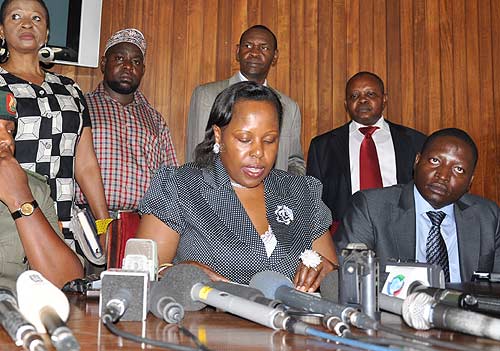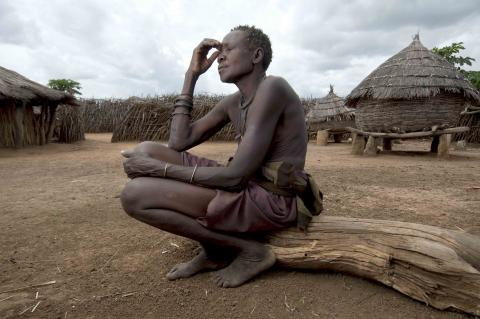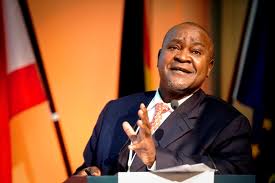Perhaps the great grand daughter of the fabled anti-colonialist and violently insurgent King Cwa Kabalega, would not have anticipated a year ago that she would be the object of online egg-throwing and virtual pelting that has come by way of the hashtag #ifkabakumba was?. Lwaboni Kabakumba however is now royally screwed but she is only partly to blame for it. The events that have led her to the political grave have its roots in a wider political quagmire within the country quite literally caused by pressures for a renewal of government at the top. As a prism within which to see the political circus that is underway now the resignation of Lwaboni offers the following comforts (or discomforts depending).
A “Salem” Witch hunt
 Judging from the stone throwing Lwaboni’s resignation is likely to set the stage for even more cries that bigger fish be deep-fried in the public bile over corruption. This is simply the mood of this sort of things. There are some who may, caught up in the wheeling and dealing, within the National Resistance Movement, hope that her head is a large bone thrown to wet the appetite of the political mob outside but this is only short-lived. As the next scandal dawns it will find that rather than whet the appetite of the politically walking dead it has stirred their longing for a bigger victim. It’s not difficult to see who.
Judging from the stone throwing Lwaboni’s resignation is likely to set the stage for even more cries that bigger fish be deep-fried in the public bile over corruption. This is simply the mood of this sort of things. There are some who may, caught up in the wheeling and dealing, within the National Resistance Movement, hope that her head is a large bone thrown to wet the appetite of the political mob outside but this is only short-lived. As the next scandal dawns it will find that rather than whet the appetite of the politically walking dead it has stirred their longing for a bigger victim. It’s not difficult to see who.
Within the NRM party, the bloodletting has targeted the Secretary General Amama Mbabazi since 2006. Its roots are deeper in the history of internal competition within that organization. This fact is shielded from the public view for the most part. The factions, families, and ego’s that erupt as a matter of public interest are in some cases historical grudges that have transcended the shape shifting of the NRM- but maintained form in the constancy of the individuals that run it.
Indeed Labwoni’s resignation or sacrifice at this political alter may be seen a useful service. Firstly as a victory for the NRM as a political party. Prior to her advent as the poster child of political scandal the party was in disarray. Handwringing over whether or not Ministers should resign or step-aside or whatever jargon fitted the desire to see political heads roll had paralyzed the party in Parliament and fueled growing intransigence in its caucus. Now with Lwaboni the party found its voice. Her crimes were more definite, needed less investigating and offered the clarion callers for political responsibility a vent to make that odd case of “zero tolerance” against corruption. Most importantly Lwaboni allowed the party to keep away from the censure precipice. Speaker Rebecca Kadaga was the first to escape that guillotine when signatures were collected for the recall of Parliament for the oil debate and she attempted to resist it. Once again signatures for a censure were collected but the censure averted by her resignation.
 A censure motion if successful would have been a sign of just how far the axe of chaos within the NRM can be wielded. Those who hoped it could be used to chop the head of bigger fish will have to wait a while longer thanks to Cwa Kabelega’s great grand daughter.
A censure motion if successful would have been a sign of just how far the axe of chaos within the NRM can be wielded. Those who hoped it could be used to chop the head of bigger fish will have to wait a while longer thanks to Cwa Kabelega’s great grand daughter.
The public interest
The politics of political responsibility as practiced in Africa or Uganda is usually a concert orchestrated by the elite- either by design (through real competition) or by default (as part of the pretenses of their politics). In the present case to the extent that the political chaos within the NRM represents agitation for change (and perhaps not reform), the present chapter may well lead to something in 2016 when the next elections are set. The main value thus far is that whatever is compelling the internal fights is being settled by public dueling and within public institutions.
This to me is a major asset since Uganda’s soft institutions including parliament needed testing in ways that were local, organic and reflective of the political dynamics of the competing forces in the country.
The other variety of grandstanding in politics is of a damaging kind. Elections in Africa are like football tournaments. They are a one off event, they entertain and distract and can also be fixed. So Presidents if they are caught up in hubris can finagle over 90% of the vote amidst a one-year jamboree for citizens put up at their own expense. Trucks with entertainers, vote buyers in party t-shirts and false promises will tour the countryside with a crumpled manifesto at the bottom of their bags and loads of cash on top. Beer sales rise, chickens, ducks and goats are slaughtered and people feel included in the national merry-making.
What helps change things however is where real competition emerges and the rules instead of being abused are tested by those who want power and are willing to steer away from stadium parties to the bad roads, health centers and employment lines. Seen like so, Labwoni’s exit maybe a down payment for the sort of useful anarchy that moves political systems forward by mediating real political competition. The jury is still out on that.
Perhaps one of the ironies of being a princess of Bunyoro, a Minister for the Presidency (the state power that has suzerainty over that ancient kingdom’s lands) and a curtain raiser of the political catfights on the eve of oil exploitation – is that its in Bunyoro that oil was discovered by British-traded companies unyet Bunyoro too was the ground zero of Uganda’s colonalization when Cwa Kabalega (1893-99) lost to imperial Britain and its allies in Buganda.
Well, add to that being a Minister for Kampala, the seat of Buganda.
But these are historical truths that serve no purpose save for reflection of course. Lwaboni’s resignation may be designed to portray order within the NRM but amongst its pressing issues is the Tullow/CNOOC/Total farm down. Am going to call the deal now. It’s basically ready for signing. In numerous interviews with people involved with this process including members of the NRM caucus – one of the outstanding issues, that of the stabilization clauses has been resolved. Parliament which put a caveat on this deal- mainly as a launch pad for the internal battles we have referenced above- is at the mercy of the cohesion of the NRM caucus. After Lwaboni, it’s possible that the caucus will be in a mood for a little compromise, which the President (even if he did not legally need to) had sought from the start when the oil debates occurred. One of the ironies of analyzing Uganda is that where its system is seen as top heavy and its leaders militant and “dictatorial”, its President Yoweri Museveni has been burning the midnight candle negotiating painstakingly with individuals and groups within the caucus in an attempt to get a deal (which he could legally veto) off the ground. I heard an odd story the other day of a Woman MP from one of the constituencies in the West of the country ,who after being granted a Presidential audience, asked only that he allow her ride his Gulf Stream 5.
“ I have always wanted to ride the Presidential Jet since I was a young girl” she allegedly pleaded.
The President in his magnanimous style turned, according to the wagging tongues who told me this tale, to Grace Akello his secretary and instructed that next time the wheels lift off- our plane loving MP should be given a seat.
The farm-down as it is now can only be delayed not by the lack of consensus between the government and the companies (in the last few weeks the heads of Tullow, Total and even the Defense Minister of China have all been to State House ostensibly to offer assurances) but if President Museveni feels he has not yet gotten a grip on internal consensus within the caucus. As the daughter of Cwa Kabalega leaves the stage- this deal about oil in her ancestral land may well be done.
Finally, the political realist in me reserves a little empathy for Lwabwoni and other recent stars in the cabinet she has temporarily left. News of her resignation came as another career professional Justice Julia Sebutinde who I have also had the pleasure to know was appointed to the International Court of Justice. Career politics in Uganda is a misnomer. Perhaps the context of a political career in the ruling party has negatively defined what its limitations are more clearly to its anxious members today.
Most of the “rebels’ in the party perhaps do not want a career in politics to be reduced to a career within the NRM since what this means in reality is a career within government when you are in favor and out of it when you are not. In the Movement years it was not unusual for cadres to expect to serve anywhere. But then it was based on how your abilities were judged – or individual merit. At its best- the system placed the right people at the right jobs.
Its not unusual to hear that distant echo of the party’s revolutionary origins mentioned in the public sphere in such words as “ I am ready to be “deployed” anywhere my party wants”. But this is rather rare and restricted to genuine idealists, mostly the old guard or committed socialists like my friend David Mafabi ( a Pan-Africanist now serving in State House).
In 2006, when the NRM was turning itself into a party, at least in form and critics would argue not substance, these problems emerged immediately at its primaries. They degenerated into a squabble with some members seeking shelter in the rules of the game outside the party itself (they run as independents, a freedom they had for the first time outside the legal regime of the NRM as a movement).
What the party discontents however reacted to was not just favoritism ( the version of unfair rules in the Movement) but in fact a system of selection whose logic until then was determined in the arbitrary and militant style of cadre selection that was the modus operandi of the “Movement”, a former socialist/communist military organization.
Multi-partyism changed expectations by introducing new rules with which to negotiate one’s “career” as a public servant ( Mp) not necessary as a cadre. The latter required loyalty to NRM and the former to winning an election. Since then “independent” minded Mps have brought their agitation for the rules to be applied “fairly” to their struggles within the party hence the so-called internal “rebels”. However those who have a seat at the table as cadres, the new hungry types, are helping themselves to several servings and being choked in the process. As newcomers they cannot say how long they will stay or make up their minds if cadreship offers more security than say politics at the ballot. Such was the fate of Mary Karoro Okurut- who is now information minister and was caught hand in till over another asset stripping scandal. There could be more to follow. The sense this writer feels is that newcomers to the system use their foot-in to build a war chest to guarantee their survival-out.
Their actions suggest perhaps that no one can tell just how long the eating season would last, either for them or for the establishment. They see the old guard as having already arrived. If cabinet ministers are hurriedly feathering their nests for some kind of political winter maybe the rest of us should worry too. It also shows the extent of the loss-of-confidence problem that the NRM faces- both in public skepticism borne out by the reaction with glee at Lwaboni’s fate and corruption in general but also internal angst about the future. Perhaps some scenario building about NRM’s inchoate succession is in order at some point here.
That however is a topic for another day. Enjoy the twitter bashing of #ifkabakumbawas in case you like the pornography of scandal that we are being served constantly these days.












